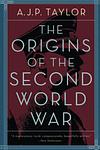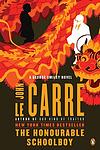The Greatest British "China" Books of All Time
Click to learn how this list is calculated.
This list represents a comprehensive and trusted collection of the greatest books. Developed through a specialized algorithm, it brings together 300 'best of' book lists to form a definitive guide to the world's most acclaimed books. For those interested in how these books are chosen, additional details can be found on the rankings page.
Genres
The "China" category for books encompasses a wide range of literature that explores the history, culture, politics, and society of China. This includes works of fiction and non-fiction, spanning from ancient times to the present day. Books in this category may delve into topics such as Chinese philosophy, art, cuisine, and language, as well as contemporary issues such as economic development, human rights, and environmental concerns. Overall, the "China" category offers readers a diverse and rich collection of books that provide insight into one of the world's oldest and most complex civilizations.
Countries
Date Range
Reading Statistics
Click the button below to see how many of these books you've read!
Download
If you're interested in downloading this list as a CSV file for use in a spreadsheet application, you can easily do so by clicking the button below. Please note that to ensure a manageable file size and faster download, the CSV will include details for only the first 500 books.
Download-
1. The Second World War by Winston Churchill
This book provides a comprehensive overview of the Second World War from the perspective of one of its most influential leaders. It covers the entire span of the war, from its origins in the political and economic turmoil of the 1930s, to the major battles and strategic decisions that shaped its course, to its aftermath and impact on the world. The author's unique perspective and firsthand experience, combined with his eloquent and insightful writing, make this a definitive account of one of the most important events in modern history.
-
2. Empire of the Sun by J. G. Ballard
"Empire of the Sun" is a semi-autobiographical novel that tells the story of a young British boy's experiences in Shanghai during World War II. After being separated from his parents during the Japanese invasion, he is forced to fend for himself in a world turned upside down by war. The novel vividly portrays the harsh realities of life in a Japanese internment camp, where the protagonist learns to adapt and survive amid the chaos and brutality.
-
3. Collected Stories by W. Somerset Maugham
"Collected Stories" is an anthology of tales that offers a broad range of human experiences, emotions, and dilemmas. The stories, set in a variety of locations around the world, explore themes such as love, betrayal, war, and societal norms. The author's keen observations of human nature and his skillful storytelling provide a captivating and thought-provoking reading experience.
-
4. In Xanadu by William Dalrymple
"In Xanadu" is a travelogue that follows the journey of a young historian and writer as he retraces Marco Polo's route from Jerusalem to the fabled city of Xanadu in Mongolia. Along the way, the author weaves together a rich tapestry of history and adventure, engaging with diverse cultures and landscapes. His travels take him through the Middle East, South Asia, and into the heart of China, offering insights into the complex interplay between past and present, and the enduring allure of one of history's most legendary journeys. The narrative is as much a personal coming-of-age story as it is a homage to the spirit of exploration and discovery.
-
5. Science and Civilisation in China by Joseph Needham
"Science and Civilisation in China" is a comprehensive and authoritative series that explores the history of Chinese science, technology, and medicine. The series delves into the significant contributions China has made in various scientific fields, including astronomy, mathematics, physics, chemistry, biology, and medical science, among others. The author also examines the cultural, philosophical, and social contexts in which these scientific advancements took place, providing a holistic view of China's scientific history and its impact on the world.
-
6. Second World War by John Keegan
"Second World War" is a comprehensive account of the global conflict that took place from 1939 to 1945. The book offers a detailed examination of the political, military, and social aspects of the war, from the rise of Hitler and the attack on Pearl Harbor, to the Holocaust and the dropping of the atomic bomb. The author provides an in-depth analysis of the strategies and tactics used by the major powers, and presents a vivid picture of the human cost of the war. The book also includes a variety of maps and photographs to help illustrate the events and locations discussed.
-
7. News from Tartary by Peter Fleming
"News from Tartary" is a riveting account of a seven-month journey across 3,500 miles of the desolate and remote areas of China, from Peking to Kashmir. The author and his companion, disguised as locals, face numerous challenges including harsh weather, dangerous landscapes, and political instability. The narrative provides a fascinating glimpse into the cultures, histories, and geopolitics of the regions they traverse, capturing the essence of an Asia that has since undergone significant transformation.
-
8. The Rose Of Tibet by Lionel Davidson
The novel is a thrilling adventure set in the 1950s, where a young British film assistant embarks on a perilous journey into the Himalayas to find his missing brother. Along the way, he encounters a hidden Tibetan kingdom, where he becomes entangled in a web of intrigue, romance, and political rebellion. As he navigates the treacherous landscape and the complexities of an ancient culture, he discovers a rare and beautiful artifact, the Rose of Tibet, which holds significant power and meaning. His quest becomes a transformative experience, challenging his endurance and reshaping his understanding of the world.
-
9. Ghostwritten by David Mitchell
Ghostwritten is a complex, interconnected narrative that spans the globe, featuring nine different characters in nine different locations, including a cult member in Okinawa, a jazz buff in Tokyo, a British investment banker in Hong Kong, an old woman running a tea shack in China, a transmigrating spirit in Mongolia, a ghostwriter in London, a physicist in Ireland, a late-night radio DJ in New York, and a noncorporeal entity in a global network. Each story is seemingly separate, but as the novel progresses, the connections between them become more apparent, creating a web of incidents and interactions that span space and time.
-
10. The Honourable Schoolboy by John le Carré
In this gripping spy thriller, a British intelligence officer named Jerry Westerby is sent on a perilous mission to uncover a complex web of corruption and espionage in Southeast Asia. As he delves deeper into the dangerous world of international politics, Westerby must navigate treacherous alliances and betrayals, risking his life to uncover the truth. With intricate plotting and masterful characterization, this novel explores the moral ambiguity and high stakes of the espionage game.
-
11. Hermit Of Peking by Hugh Trevor-Roper
"Hermit of Peking" is a captivating biography that explores the enigmatic life of Sir Edmund Backhouse, a British sinologist and orientalist who lived in Beijing during the late 19th and early 20th centuries. The book delves into Backhouse's controversial career, including his role as a scholar, his fraudulent historical documents, and his eccentric personal life. Drawing from a wealth of sources, the author critically examines Backhouse's contributions to Western perceptions of China, revealing a complex figure whose legacy is a blend of genuine scholarship and elaborate deceit.
-
12. Something Like A House by Sid Smith
"Something Like A House" is a poignant and thought-provoking novel that explores the complex relationships between family members and the impact of secrets on their lives. Set in post-war Britain, the story follows a young boy named Joe who is sent to live with his estranged grandparents in a dilapidated house. As Joe uncovers the truth about his family's past, he must navigate the emotional turmoil and challenges that arise, ultimately discovering the power of forgiveness and the importance of finding one's own identity.
-
13. Maoism by Julia Lovell
"Maoism: A Global History" explores the profound influence of Maoist ideology beyond China, tracing its impact and adaptation in various countries around the world. The book delves into how Mao Zedong's ideas were interpreted and applied in different contexts, from the jungles of Southeast Asia to the urban centers of Europe and America, shaping revolutionary movements and national policies. It examines the allure of Maoism to its international adherents, the resulting political or violent struggles, and its legacy in contemporary politics, offering a comprehensive analysis of how a Chinese revolutionary ideology transformed into a global phenomenon.
Reading Statistics
Click the button below to see how many of these books you've read!
Download
If you're interested in downloading this list as a CSV file for use in a spreadsheet application, you can easily do so by clicking the button below. Please note that to ensure a manageable file size and faster download, the CSV will include details for only the first 500 books.
Download











